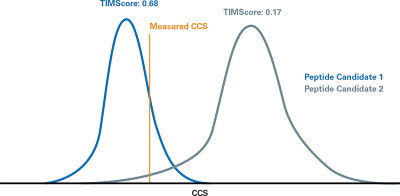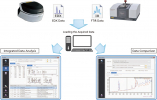
Collisional cross section (CCS) values in 4D-Proteomics applications are used in post processing for “match between runs” for label-free quantitation. Bruker’s TIMScore software now harnesses machine learning for a CCS-enabled algorithm enabling search engines to provide greater peptide and protein identification while retaining stringent false discovery rates. Hundreds of thousands of experimental data points were used to train a ML algorithm that can accurately predict CCS value of tryptic and phosphorylated peptides. Phosphorylation plays a critical role in cell signalling and biology, but phosphorylated peptides are more difficult to identify. TIMScore increased the number of phosphorylated peptides by >10 % in unenriched leukaemia cell line samples provided by Professor Eric Fischer at the Dana Farber Cancer Institute.


